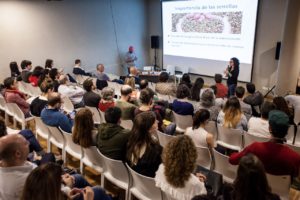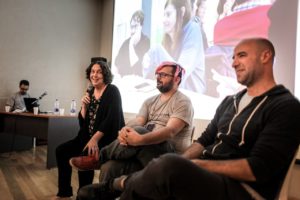On Friday, November 2nd, the Argentine Congress of Open and Citizen Science (CIACIAR) was held at the University of San Martín, organized by CENIT and Cientópolis, and sponsored by STEPS Latin America. It was a meeting attended by more than 200 people among researchers, scientists, disseminators of science and technology, and university students from Buenos Aires, La Plata, Rosario, Córdoba, Río Cuarto and Mendoza.
Ciaciar is an unusual meeting in that it combines the participation of academics from different disciplines from synthetic biology, physics and programming to sociology and digital humanities. The congress had a decontracting tone and focused on debate and learning experiences. Ciaciar aims to experiment with openness and encourages for new voices to participate in the production of scientific knowledge.

The theme of this year’s congress was “The Challenges of Openness” and various activities were developed around this motto. The day began at 9 o’clock in the Central Library with a talk discussion that included the presence of Agostina Mileo (known as The Scientific Barbie), Anabel Marín (director of Bioleft), Alejandro Nadra (co-founder of Tecnox) and Gabriel Gellón (Expedition Science). “Do you manage to do science in the same way as always and make it available or do you have to do something else? Perhaps we will have to assume an active role in the interpretation of knowledge “, said Agostina Mileo in her initial talk.
As the day went by 8 open workshops were carried out, promoting group dynamics, and covering different topics. In the morning, workshops on Science and Gender, and Science and Games were developed and in the afternoon there were on digital ethnography, the new agenda on medicinal cannabis and even the screening of a documentary on rights and democracy in Latin America. In addition, posters of research projects and an art and science fair were presented, with stands ranging from 3D bio impression, gamification in a citizen science project and an interactive topographic map of the MUMIN (Mineral Museum).

This is the second year that this initiative is celebrated; in 2017 it was held the Open and Citizen Science Workshop at La Plata University. Like the last edition, the objective of the congress is to connect the different actors and experiences involved in open science, in order to consolidate the process of opening scientific knowledge. “It is not possible to create a democratic culture if we don’t open our scientific practices”, said Mariano Fressoli, researcher and organizer of the event.
Other talks that stood out were those of Guadalupe Nogués and Martín De Ambrosio about open science in post-truth era and fake news, Paula Peyloubet on science and development, and Ivonne Lujano, DOAJ’s ambassador in Latin America, about open access journals and issues related to publication of scientific papers.

Ciaciar’s closing meeting was in charge of Diego Torres (Cientópolis), María Guillermina D’Onofrio (Secretary of Science and Technology) and Mariano Fressoli, who highlighted the joint efforts and appealed to continue strengthening the ties. “Change is urgent and it will not happen alone. If we want to continue working on open science, we have to start thinking big”, concluded Fressoli.
